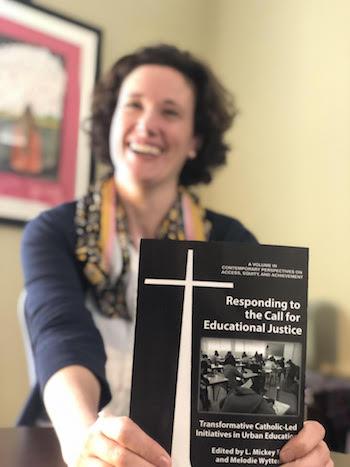
Welcome back to Press Play, ACE's new segment highlighting the latest and greatest publications coming out of the Institute for Educational Initiatives. Consider this part of the newsletter a movie trailer for the literary world.
Spoiler Alert: We look forward to sharing a bit about the book and its author—just enough to pique your interest—then we'll race you to the bookstore.
See you on the last page!
Guest: Melodie Wyttenbach, Ph.D.
Book: Responding to the Call for Educational Justice: Transformative Catholic-Led Initiatives in Urban Education
Congratulations on the new book!
Thank you! I was so grateful to work on this with Mickey Fenzel, a friend and professor at Loyola University in Maryland who for decades has examined how Catholic urban schools serve traditionally marginalized students. With his research expertise and my experience as a leader in this sector, it was an exciting project to work on examining what leaders of Catholic-led educational initiatives are doing to break the cycle of poverty.
What is the number one thing you want people to understand about this book?
This book captures stories of hope that exist in our urban communities, especially those led by religious communities. Thinking about the many disparities that exist there—the challenges with poverty, the structural racism—this is an opportunity to examine the urban context and see the good that is happening there, truly asking what are we doing to serve those who are at the margins? How are we living out the Catholic social teaching of a preferential option for the poor?
Is this a theoretical book or a hands-on volume of "how-tos"?
It's interesting. Theory in the sense that many chapters are informed by some theory, like critical race theory, but it's a call to action to bring about equity in systems of justice within our society. It captures bright spots in urban education, discussing what is actually happening. So, a practitioner could take it and read it and say these are some of the key elements of a given program that can be applied, such as graduate support programs, but it's not a handbook.
You talk about a number of initiatives that can improve urban education. What initiatives are you focused on in this volume?
There are no shortage initiatives happening nationally and internationally that we cover, but need to be written about more. We discuss the NativityMiguel Network of schools, Cristo Rey Network of schools, we talk about St. Benedict's Prep in Newark, NJ. We also look at how programs like Notre Dame Missionary Volunteer Program and Fe y Alegria that are having are impacting lives on a great scale internationally. Ideally, we hope to see replicating these initiatives in areas where we know the need is great.
Who is the best target market for this book?
Many people, including researchers, practitioners, and funders who want to know how Catholic initiatives bring about access, equity, and success for the traditionally marginalized.
What is the most surprising thing you learned when writing this book?
There are so many people who are committed to bringing about equitable educational systems for the marginalized, people who sometimes are forgotten. It's inspiring to learn about those who have started an initiative, started a school, or led a network, who have a long commitment to justice. There's something inside them, it's part of their being and way of living, and they inspire others to want to be a part of that. That inspiration is a common thread in each of these stories!
What three words would you use to best describe this book?
These people are entrepreneurial, committed, they have a deep faith: a deep sense of God and self. A real desire to serve others. Service.
Hard to do in just three words, right, Melodie?!
Ha! Ok. Servant leaders, Oh, shoot, that's two words. Committed to justice and deeply spiritual.
FUN FACTS
Roller skates or roller blades?
Roller skates.
PB&J, mac-n-cheese, or chicken fingers?
Mac-n-cheese.
If you could meet one person from the Bible - besides Jesus, Mary, or Joseph - who would it be? Why?
Elizabeth. She's always someone who people turn to, had that loving embrace. Just wanting to emulate that and also have that experience would be pretty amazing.
Would you rather live in the Sahara or Antarctica?
Antarctica.
If you could remove one word from the English language what would it be?
Hate.
If you could be an Olympic athlete, in what sport would you compete?
400 meter. Wilma Rudolph. When I grew up I read her autobiography, and I just was so inspired! I ran that leg in the mile relay and often thought of her. I continue to see that image of her crossing that finish line, leading with her heart, and am so inspired by that.
 Alliance for Catholic Education
Alliance for Catholic Education
